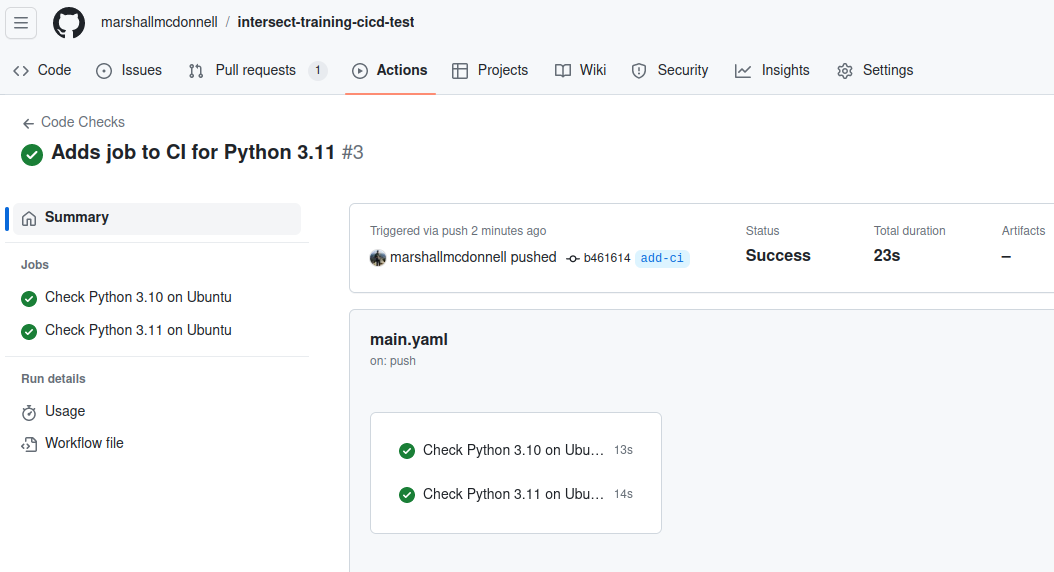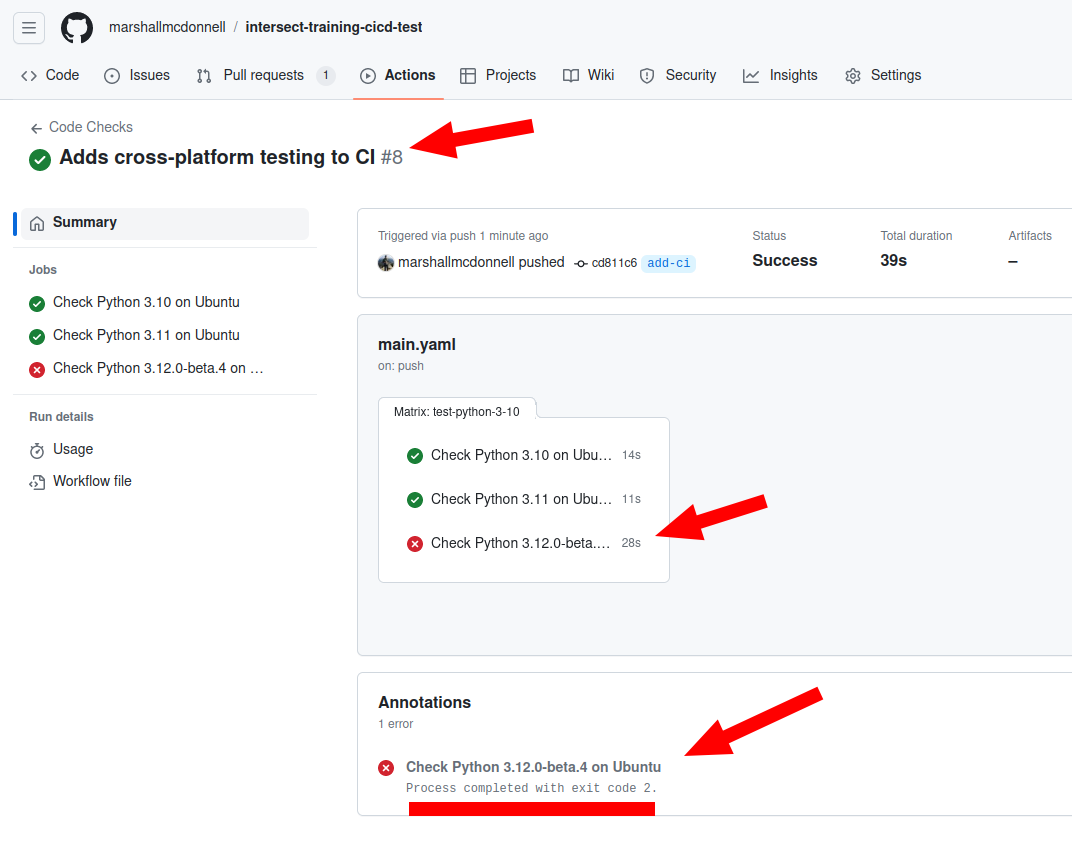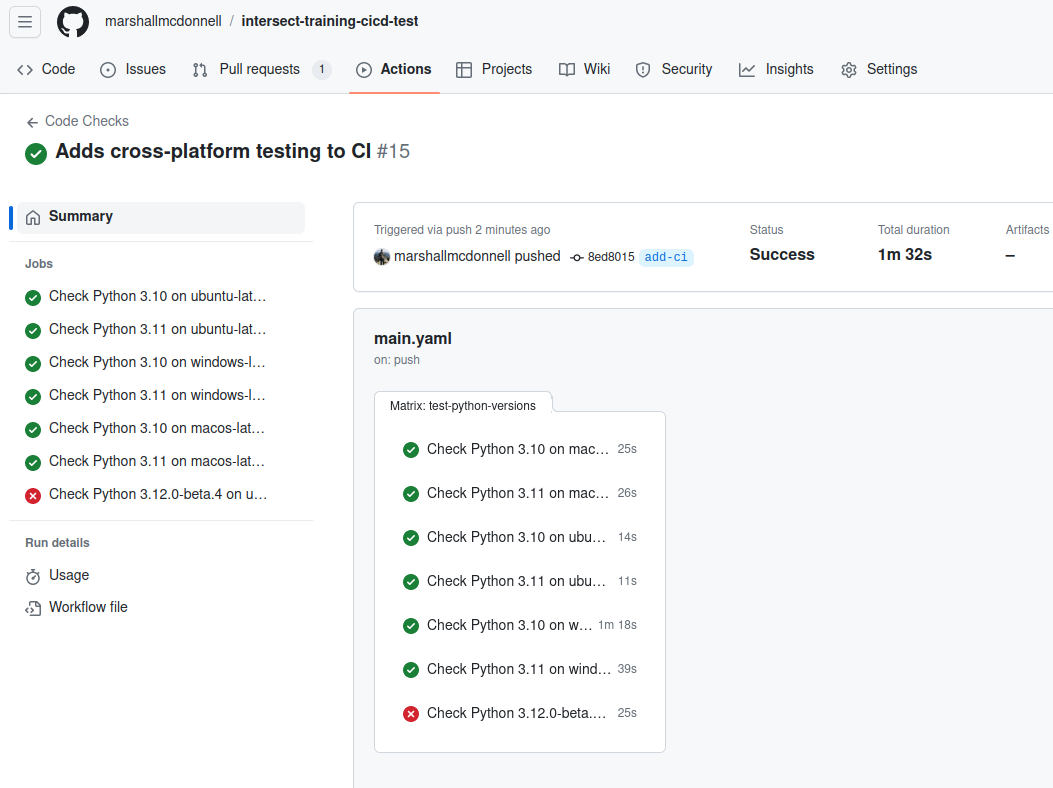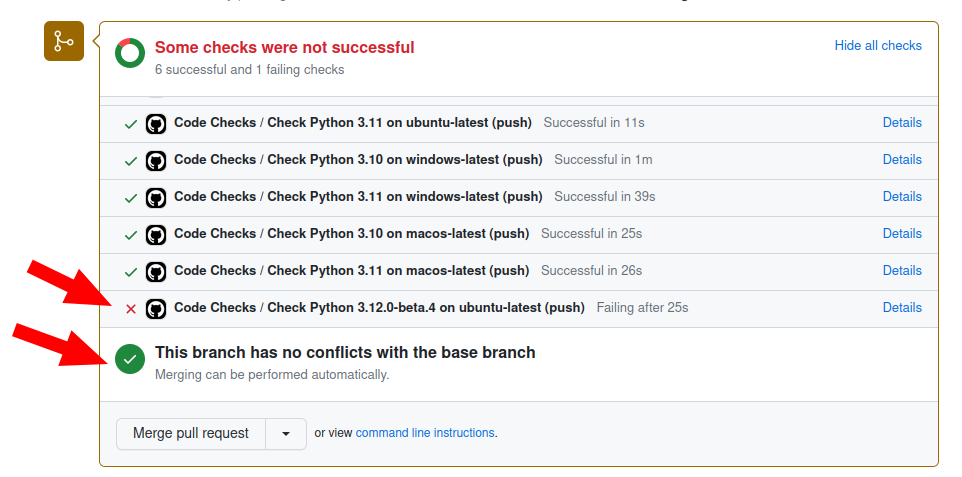Matrix
Last updated on 2025-07-18 | Edit this page
Overview
Questions
- How do I run CI for multiple Python versions and /or different platforms?
Objectives
- Don’t Repeat Yourself (DRY)
- Use a single job for multiple jobs
Let’s assume our tests are running great.
Yet, the domain scientist reports they are getting errors when they run the Python package.
After talking with them, you find that they are running Python 3.11, not 3.10.
How do we include this version of Python in our testing?
Multiple version Python testing - Naive Approach
One approach would be to add another job to run tests for Python 3.11 as well.
Up to this point, we currently have the following:
YAML
name: Code Checks
on: push
jobs:
greeting:
runs-on: ubuntu-latest
steps:
- name: Greeting!
run: echo hello world
test-python-3-10:
name: Check Python 3.10 on Ubuntu
runs-on: ubuntu-latest
steps:
- uses: actions/checkout@v4
- uses: actions/setup-python@v5
with:
python-version: "3.10"
- name: Install package
run: python -m pip install -e .[test]
- name: Test package
run: python -m pytestLet’s add testing a different version of Python in our CI!
Action: Add Python 3.11 test
First, remove the greeting job.
Then, add a new job called test-python-3-11.
Have this new job:
- Checkout the code
- Setup a Python 3.11 environment
- Install the package with our test dependencies
- Run the tests via
pytest
YAML
name: Code Checks
on: push
jobs:
test-python-3-10:
name: Check Python 3.10 on Ubuntu
runs-on: ubuntu-latest
steps:
- uses: actions/checkout@v4
- uses: actions/setup-python@v5
with:
python-version: "3.10"
- name: Install package
run: python -m pip install -e .[test]
- name: Test package
run: python -m pytest
test-python-3-11:
name: Check Python 3.11 on Ubuntu
runs-on: ubuntu-latest
steps:
- uses: actions/checkout@v3
- uses: actions/setup-python@v5
with:
python-version: "3.11"
- name: Install package
run: python -m pip install -e .[test]
- name: Test package
run: python -m pytestNow, let’s add this so we can catch any Python 3.11 bugs going forward!
Check the output!

Now, we do technically have multiple-versions of Python supported.
Yet, we just added 13 lines of identical code with only one character change…
DRY your CI
“DRY” is an ancronym for “Don’t Repeat Yourself”, meaning don’t have repeated code in your software. This reduces repetition and avoids redundancy.
We do this for our software. There is no reason we should not apply this principle to CI!
Matrix
Action: Building a matrix across different versions
We could do better using matrix. The latter allows us to
test the code against a combination of versions in a single job. Let’s
update our .github/workflow/main.yml and use
matrix.
YAML
name: Code Checks
on: push
jobs:
test-python-versions:
name: Check Python ${{ matrix.python-version }} on Ubuntu
runs-on: ubuntu-latest
strategy:
matrix:
python-version: ["3.10", "3.11"]
steps:
- uses: actions/checkout@v3
- name: Setup Python ${{ matrix.python-version }}
uses: actions/setup-python@v4
with:
python-version: ${{ matrix.python-version }}
- name: Install package
run: python -m pip install -e .[test]
- name: Test package
run: python -m pytestYAML truncates trailing zeroes from a floating point number, which
means that version: [3.9, 3.10, 3.11] will automatically be
converted to version: [3.9, 3.1, 3.11] (notice
3.1 instead of 3.10). The conversion will lead
to unexpected failures as your CI will be running on a version not
specified by you. This behavior resulted in several failed jobs after
the release of Python 3.10 on GitHub Actions. The conversion (and the
build failure) can be avoided by converting the floating point number to
strings - version: ['3.9', '3.10', '3.11'].
More details on matrix: https://docs.github.com/en/actions/reference/workflow-syntax-for-github-actions.
We can push the changes to GitHub and see how it will look like.
BASH
git add .github/workflows/main.yml
git commit -m "Adds multi-version Python testing to CI via matrix"
git pushThat is a much better way to add new versions and we have a DRY-compliant CI!
Test experimental versions in CI
Sometimes in your matrix, you want to push the boundaries of your testing.
An example would be to test up to the latest alpha / beta release of a Python version.
You do not want a failure in such cutting-edge, unstable tests stopping your CI.
At time of writing, the latest supported beta version of Python for
the actions/python-versions is 3.14.0-beta.4 based on their
GitHub
Releases.
Let’s add this to our python version testing.
Allow experimental jobs to fail in CI
This gets a little complicated, but there are a few flags we need to set.
GitHub Actions will cancel all in-progress and queued jobs in the matrix if any job in the matrix fails.
To disable this, we need to disable fail-fast in the
matrix strategy.
That should do it, right? Nope…
We have to add continue-on-error: true to a single job
that we allow to fail. If enabled, jobs in the matrix continue to run if
there is an error. By default continue-on-error: false and
will also cancel the matrix jobs if the “experimental” job fails.
More details: https://docs.github.com/en/actions/using-workflows/workflow-syntax-for-github-actions#jobsjob_idstrategyfail-fast
Finally, we need to add this experimental job to the matrix. Also, we need to flag it as “allowed to fail” somehow.
For this, we use include to add a single extra job to
the matrix with “metadata”.
This will add the string "3.14.0-beta.4" to the
python-version list in matrix with the arbitrary variable
allow_failure set to true as “metadata”. We
also must add the allow_failure “metadata” to the other
members of the matrix (see below).
More detail: https://docs.github.com/en/actions/using-workflows/workflow-syntax-for-github-actions#jobsjob_idstrategymatrixinclude
Putting it together for Python experimental job…
So if we only want to allow the job with version set
to 3.14.0-beta.4 to fail without failing the workflow run,
we need something like:
Then the following would work for a job:
Now to add it…
Action: Add experimental job that is allowed to fail in the matrix
Add “3.14.0-beta.4” to our current Python package CI YAML via the matrix but allow it to fail.
Below is a solution for .github/workflow/main.yml:
YAML
name: Code Checks
on: push
jobs:
test-python-versions:
name: Check Python ${{ matrix.python-version }} on Ubuntu
runs-on: ubuntu-latest
continue-on-error: ${{ matrix.allow_failure }}
strategy:
fail-fast: false
matrix:
python-version: ["3.10", "3.11"]
allow_failure: [false]
include:
- python-version: "3.14.0-beta.4"
allow_failure: true
steps:
- uses: actions/checkout@v3
- name: Setup Python ${{ matrix.python-version }}
uses: actions/setup-python@v4
with:
python-version: ${{ matrix.python-version }}
- name: Install package
run: python -m pip install -e .[test]
- name: Test package
run: python -m pytestLet’s commit this and see how it looks!
BASH
git add .github/workflows/main.yml
git commit -m "Adds experimental Python 3.14.0-beta.4 test to CI"
git push -u origin add-ciWe see that the overall workflow passed even though the Python 3.14.0-beta.4 job failed!
Also, note that we see that GitHub Actions reports an exit code that is non-zero! Like previously discussed, exit codes are what CI tools / solution are built around.

Experimental CI jobs
This allows us to run all kinds of “experimental” jobs. Examples are trying new versions of software or checking deprecated versions.
Cross-platform testing
Uh oh… the domain scientist is back with an issue.
After talking with him, you find out his summer intern cannot run the python package on their Windows machine.
You have Linux Ubuntu and your domain scientist collaborator / team member has Mac.
How do we test our Python package across Linux, Mac, and Windows (i.e. cross-platform)?
Selecting the GitHub-hosted runner platform
We honestly already have what we need, the runs-on
command!
All we need to know is what values are allowed.
Inside of the runs-on documentation, there is a list of
labels we can use to select the platform of the runner: list
of labels for runner types
Action: Find out the labels for all three platforms
Using the documentation links above, get the three “latest” labels for Linux, Mac, and Windows.
- Linux:
ubuntu-latest - Mac:
macos-latest - Windows:
windows-latest
Using these labels, we could create the following setup to run on all three platforms!
Not necessarily the best practice to use “latest”…
It is arguable but… using “latest” versions for the platforms may not be the best practice. This practice is essentially testing versions of the platforms that will change, eventually, when the newest OS platform version is created for “latest”.
This leaves you vulnerable to your CI breaking due to no change to the code.
However, this is a very infrequent change and probably fine to stay with “latest” so you don’t have to change when the other eventual change will occur: a pinned version of the OS platform is deprecated and no longer available!
Action: Add cross-platform testing to CI YAML
Using the “latest” labels, add Linux, Mac, and Windows testing to our current CI YAML.
HINT: You will need a variable under matrix that you use
for runs-on and also for the include
YAML
name: Code Checks
on: push
jobs:
test-python-versions:
name: Check Python ${{ matrix.python-version }} on ${{ matrix.runs-on }}
continue-on-error: ${{ matrix.allow_failure }}
runs-on: ${{ matrix.runs-on }}
strategy:
fail-fast: false
matrix:
runs-on: [ubuntu-latest, windows-latest, macos-latest]
python-version: ["3.10", "3.11"]
allow_failure: [false]
include:
- python-version: "3.14.0-beta.4"
runs-on: ubuntu-latest
allow_failure: true
steps:
- uses: actions/checkout@v3
- name: Setup Python ${{ matrix.python-version }}
uses: actions/setup-python@v4
with:
python-version: ${{ matrix.python-version }}
- name: Install package
run: python -m pip install -e .[test]
- name: Test package
run: python -m pytestLet’s push these changes and see how it goes!
We see that now we are also testing across all the platforms!

Pull Request
That wraps up the CI portion for the Python package.
If you’d like, you can add more steps to the jobs to perform other checks (i.e. linting, format checks, documentation builds, etc.)
Once you are happy, let’s use our open pull request for this branch
and get it merged back into main!
You’ll notice that the Pull Request shows us that a CI check didn’t pass but the overall workflow passed and able to be merged in!

Clean up local repository
To get your local repository up-to-date, you can run the following:
BASH
git checkout main
git pull
git remote prune origin # prune any branches deleted in the remote / GitHub that are still local
git branch -D add-ci # optional- Matrix can help DRY your CI for multi-version and cross-platform testing
- Using
matrixallows to test the code against a combination of versions.
